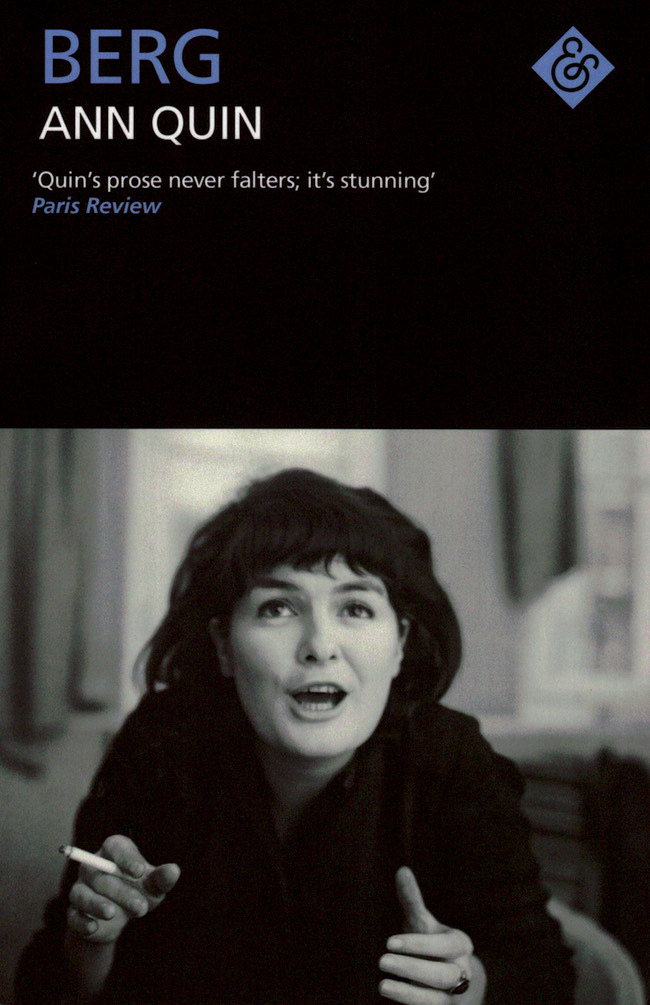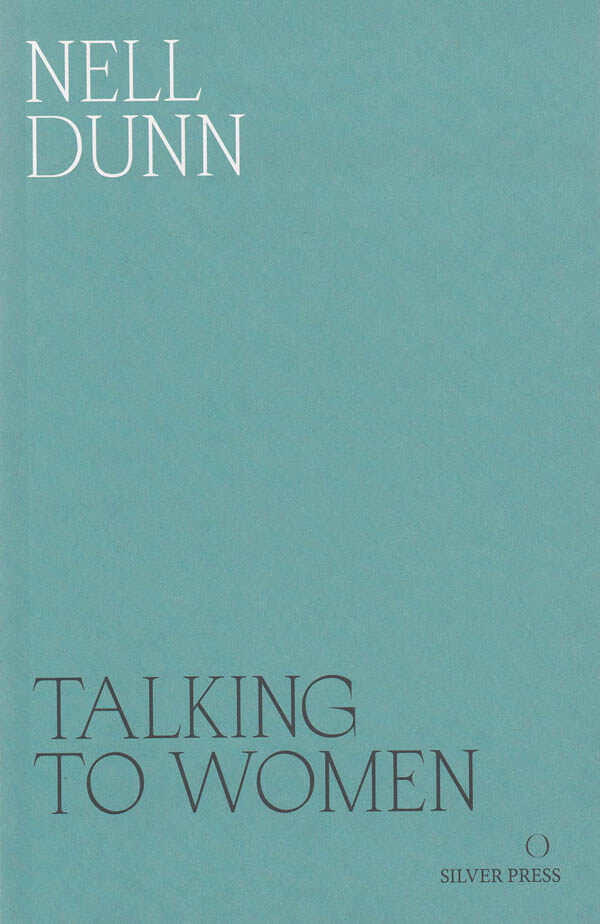Ann Quin
Ann Quin

Tripticks
First published in 1972, Ann Quin's fourth and final novel was a radical break from the introspective style she had developed in Three and Passages: a declaration of independence from all expectations.
Brashly experimental, ribald, and hilarious, Tripticks maps new territories for the novel—aspiring to a form of pop art via the drawings of the artist Carol Annand and anticipating the genre-busting work of Kathy Acker through collage and gory satire.
Splattering its pages with the story of a man being chased across a nightmarish America by his "first X-wife," and her "schoolboy gigolo," Tripticks was ground zero for the collision of punk energy with high style.

Berg
"A man called Berg, who changed his name to Greb, came to a seaside town intending to kill his father. . ."
So begins Ann Quin's madcap frolic with sinister undertones, a debut "so staggeringly superior to most you'll never forget it" (The Guardian). Alistair Berg hears where his father, who has been absent from his life since his infancy, is living. Without revealing his identity, Berg takes a room next to the one where his father and father's mistress are lodging and he starts to plot his father's elimination. Seduction and violence follow, though not quite as Berg intends, with Quin lending the proceedings a delightful absurdist humor.
Anarchic, heady, dark, Berg is Quin's masterpiece, a classic of post-war avant-garde British writing, and now finally back in print after much demand.
Ann Quin (b. 1936) was a British writer from Brighton. She was prominent amongst a group of British experimental writers of the 1960s, which included B.S. Johnson. Prior to her death in 1973, she published four novels: Berg (1964), Three (1966), Passages (1969), and Tripticks (1972). A collection of short stories and fragments, The Unmapped Country (edited by Jennifer Hodgson) was published by And Other Stories in 2018.

Three
S has disappeared from Ruth and Leonard's home in Brighton. Suicide is suspected. The couple, who had been spying on their young lodger since before the trouble, begin to pour over her diary, her audio recordings and her movies - only to discover that she had been spying on them with even greater intensity. As this disturbing, highly charged act of reciprocal voyeurism comes to light, and as the couple's fascination with S comes to dominate their already flawed marriage, what emerges is an unnerving and absorbing portrait of the taboos, emotional and sexual, that broke behind the closed doors of 1950s British life.
Ann Quin (1936-1973) was a working-class writer from Brighton, England. She was at the forefront of British experimentalism in the 1960s along with BS Johnson and Alan Burns. Prior to her death in 1973, she published four novels: Berg(1964), Three (1966), Passages (1969) and Tripticks (1972). A collection of short stories and fragments, The Unmapped Country (edited by Jennifer Hodgson), was published by And Other Stories in 2018. Quin's novel Berg was republished by And Other Stories in 2019, followed by Three in 2020.

Passages
A book of voices, landscapes and seasons, Ann Quin's newly republished novel mirrors the multiplicity of meanings of the very word 'passage', of music, of time, and of life itself. A woman, accompanied by her lover, searches for her lost brother, who may have been a revolutionary, and who may have been tortured, imprisoned or killed. Roving through a Mediterranean landscape, they live out their entangled existences, reluctant to give up, afraid of the outcome.
Reflecting the schizophrenia of its characters, the novel splits into alternating passages, switching between the sister and her lover's perspective. The lover's passages are also fractured, taking the form of a diary with notes alongside the entries. An intricate system of repetition and relation builds across the passages. 'All seasons passed through before the pattern formed, collected in parts.'
Ann Quin (1936-1973) was a working-class writer from Brighton, England. She was at the forefront of British experimentalism in the 1960s along with BS Johnson and Alan Burns. Prior to her death in 1973, she published four novels: Berg(1964), Three (1966), Passages (1969) and Tripticks (1972). A collection of short stories and fragments, The Unmapped Country (edited by Jennifer Hodgson), was published by And Other Stories to great acclaim in 2018. Quin's novel Berg was republished by And Other Stories in 2019, followed by Three in 2020.
And more

UH HUH HER
An unnamed, female narrator travels through school, then art school, then art school teaching jobs, finding or fashioning “the selves of herself” via encounters with PJ Harvey, the ghosts of Ann Quin, Susan Sontag, and a mansplaining Analyst that she first encounters in her grandparents’ garden. Both a love letter to creative life, and a requiem for all that is lost in its pursuit, UH HUH HER asks is it possible to record—and retain—our experiences of being on the outside? Or can such stories only exist within the institutions that both literally and metaphorically shape them?

Dies: A Sentence
Dies: A Sentence by Vanessa Place is a 117-page, one-sentence novel about the coils of language and war, unspooled in the dying breath of a pre- and post-scient World War I soldier.
John Witte of the Northwest Review calls Dies, "a marvel of sustained synergy," author Jim Krusoe describes the book as "dizzyingly complex, compound, and full of miraculous side trips as well," and novelist Doug Nufer heralds DIES as a "delightful tour de force of a hopelessly grim predicament." Place obliterates the line between victim and perpetrator, subject and object, rendering this human truth: in the death sentence of life, there is still beauty. "Roll over, dear Whitman," says Susan McCabe in her Introduction, "Here's our new original."
“In a single sentence as bloody and crazed as the history of the 20th century, Place offers up “the untamed cadence of ten thousand feet.” Caught somewhere between Beckett’s The Unnamable, Kathy Acker’s Don Quixote, James Joyce’s Finnegans Wake and Ann Quin’s Passages, Dies is an extravagant and ferocious book, a real and uncompromising marvel.” — Brian Evenson
“The architectonics of Dies calls upon the aural touchstones, not only of Pound, but of Dante, Rabelais (beware of a scatological extravaganza), Eliot, Whitman, Stein, the Bible, Beckett, Joyce, Remarque, even ‘the ghost of mark twain‘—a babbling horde that makes this sentence both humbling and beyond paraphrase, both mythic and contemporary.” — Susan McCabe
Introduction by Susan McCabe.

Talking To Women
With an introduction by Ali Smith and a new afterword by Nell Dunn.
In 1964, Nell Dunn spoke to nine of her friends over a bottle of wine about sex, work, money, babies, freedom and love. The novelist Ann Quin says she appears to be a 'singular girl, singular and single’ but questions the use she makes of her freedom. The Pop artist Pauline Boty reveals she married 'the first man I could talk very freely to’ ten days after meeting him. Kathy Collier, who worked with Dunn in a Battersea sweet factory, talks about what it takes to 'get out’ of a life that isn’t fulfilling. Edna O’Brien tells us about the time she inadvertently stole a brown georgette scarf and the lesson she took from it: 'Morality is not the same thing as abstinence.’